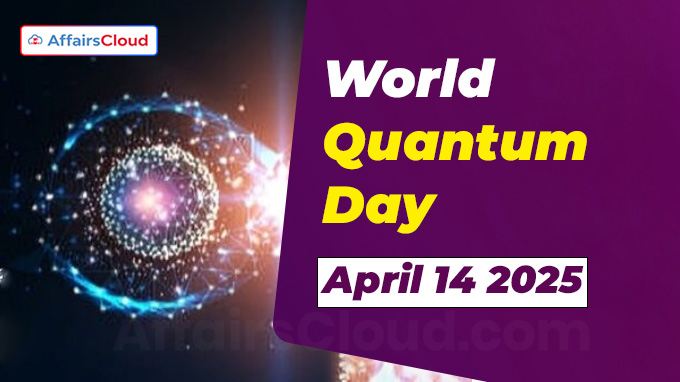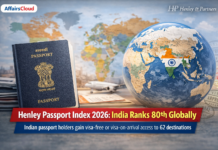 World Quantum Day is observed annually worldwide on 14th April to promote global awareness and understanding of quantum science and technology.
World Quantum Day is observed annually worldwide on 14th April to promote global awareness and understanding of quantum science and technology.
- The day aims to highlight quantum science as the language of the universe and encourage global cooperation in its research and application.
- April 14, 2025, marks the observance of the 4th World Quantum Day.
Note: In 2025, the day coincides with the International Year of Quantum Science and Technology (IYQST) designated by the United Nations (UN).
Background:
i.World Quantum Day was initiated on 14 April 2021 by quantum scientists from over 65 countries.
ii.The first official observance of the day was held globally on 14 April 2022.
iii.On 2 May 2023, the Senate of the United States of America (USA) passed a bipartisan resolution to officially commemorate World Quantum Day and endorse its objectives, signifying its global recognition and support.
Why April 14?
i.World Quantum Day is observed on 14 April (formatted as 4/14 in the month/day format), a reference to 4.14, the rounded first digits of Planck’s constant.
ii.Planck’s constant is a fundamental value in quantum physics, expressed as 4.1356677 × 10^-15 electron volt second (eV·s), which is equal to 0.000 000 000 000 004 1356677 eV·s.
India’s Quantum Strategy: ITES-Q Report:
On the occasion of World Quantum Day 2025, the Office of the Principal Scientific Adviser (PSA) to the Government of India (GoI) released the first edition of the International Technology Engagement Strategy for Quantum (ITES-Q), aimed at boosting India’s global leadership in Quantum Science, Technology, and Innovation (QSTI).
- The report was launched by Prof. Ajay Kumar Sood, PSA to GoI, during a podcast marking World Quantum Day 2025.
- It aligns with India’s National Quantum Mission (NQM), launched by the Department of Science and Technology (DST) under the Ministry of Science and Technology (MoS&T).
Key Insights from the ITES-Q Report:
i.Only 2.6% of surveyed Ph.D (Doctor of Philosophy) and postdoctoral researchers in India currently receive industry funding, showing a gap in public-private partnerships.
ii.The report identifies opportunities in quantum hardware development to reduce reliance on imports and highlights the need to increase funding for startups.
iii.It urges the need to develop global standards in Quantum Technology (QT) to ensure strategic autonomy and strengthen India’s position in the international ecosystem.
QNu Labs Launches QShield, World’s First Unified Platform:
On World Quantum Day 2025, Bengaluru (Karnataka) based QNu Labs, a quantum cybersecurity startup incubated at Indian Institute of Technology (IIT) Madras (Chennai, Tamil Nadu (TN)) Research Park in 2016, launched QShield, the world’s first unique platform for seamless cryptography management across cloud, on-premises, and hybrid environments.
Features of QShield:
i.Integrates Quantum Key Distribution (Armos), Quantum Random Number Generator (Tropos), Quantum Hardware Security Module (QHSM), and Post-Quantum Cryptography (PQC) compliant with the National Institute of Standards and Technology (NIST).
ii.It offers services such as Qosmos (Quantum key generation), QConnect (Secure connectivity), QVerse (Secure collaboration), QSFS (Secure file storage and sharing), and QVault (Key management).
About National Quantum Mission (NQM):
i.The National Quantum Mission (NQM) is a key initiative of the Government of India (GoI) aimed at advancing India’s leadership in quantum technology research and development.
ii.Approved by the Union Cabinet on 19th April 2023, the mission is being implemented during 2023–24 to 2030–31 with a total budget allocation of Rs. 6,003.65 crore.
iii.The NQM is led by the Department of Science & Technology (DST), the Ministry of Science and Technology (MoS&T).
iv.It aims to harness quantum technologies in India to bolster sectors like communication, cryptography, and computing.
v.As part of this mission, four Thematic Hubs (T-Hubs) with 14 Technical Groups across 17 states and 2 Union Territories (UTs) were set up to focus on innovation, skills, industry, and collaboration. The four T-Hubs are
- Indian Institute of Science (IISc) Bengaluru (Karnataka)
- IIT Madras (Tamil Nadu, TN), in association with the Centre for Development of Telematics (C-DOT), New Delhi (Delhi)
- IIT Bombay (Maharashtra)
- IIT Delhi (Delhi)




